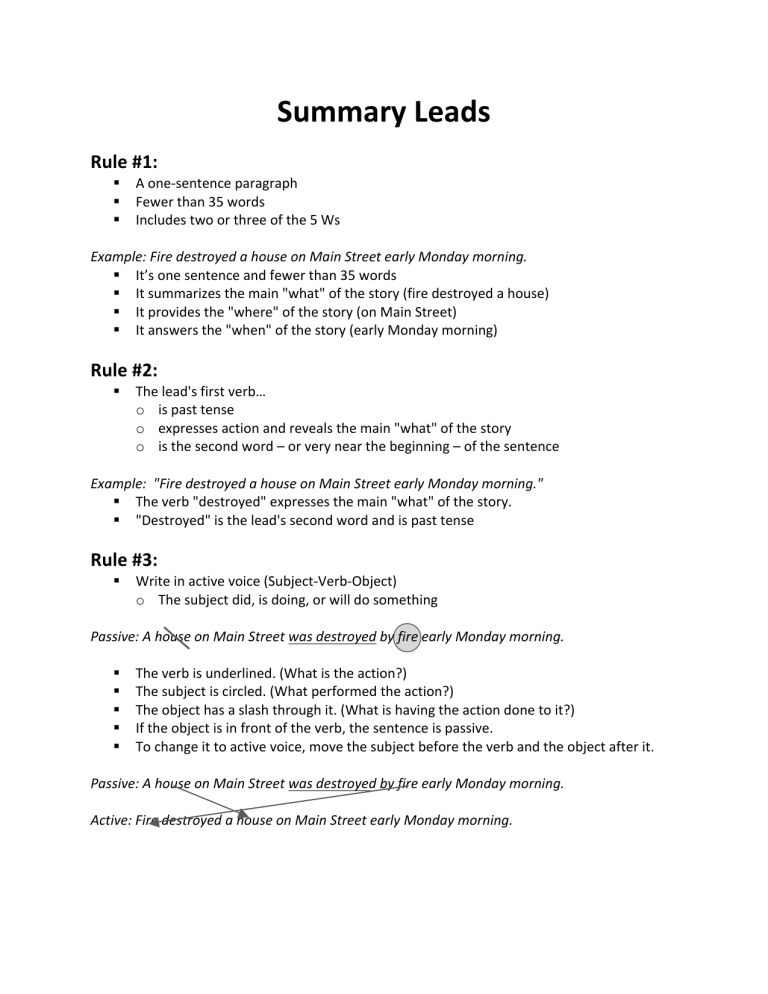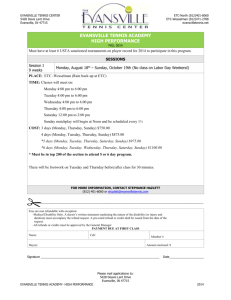Summary Leads - WordPress.com

Summary Leads
Rule #1:
A one-‐sentence paragraph
Fewer than 35 words
Includes two or three of the 5 Ws
Example: Fire destroyed a house on Main Street early Monday morning.
It’s one sentence and fewer than 35 words
It summarizes the main "what" of the story (fire destroyed a house)
It provides the "where" of the story (on Main Street)
It answers the "when" of the story (early Monday morning)
Rule #2:
The lead's first verb… o is past tense o expresses action and reveals the main "what" of the story o is the second word – or very near the beginning – of the sentence
Example: "Fire destroyed a house on Main Street early Monday morning."
The verb "destroyed" expresses the main "what" of the story.
"Destroyed" is the lead's second word and is past tense
Rule #3:
Write in active voice (Subject-‐Verb-‐Object) o The subject did, is doing, or will do something
Passive: A house on Main Street was destroyed by fire early Monday morning.
The verb is underlined. (What is the action?)
The subject is circled. (What performed the action?)
The object has a slash through it. (What is having the action done to it?)
If the object is in front of the verb, the sentence is passive.
To change it to active voice, move the subject before the verb and the object after it.
Passive: A house on Main Street was destroyed by fire early Monday morning.
Active: Fire destroyed a house on Main Street early Monday morning.
Rule #4
Use delayed identification
Unless a person is well known, do not use a name in the lead.
Identify the person in other terms in the lead. o “an Evansville woman” or “a Kentucky teenager” (city or state of residence) o “a gas station clerk” or “a welder on the construction site of the new arena”
(occupation or where the person was at the time of the event) o “a 12-‐year-‐old boy” or “an elderly woman”
Use the person’s name in the second paragraph
Delayed Identification Example:
An elderly Evansville man died Monday when an early morning fire raged through his
Main Street home.
Firefighters said they found Marvin Gaines, 81, in a second-‐floor bedroom of the house at 501 Main St.
Prominent Person Example:
Former Evansville Mayor Joe Smith died Monday when an early morning fire raged through his Main Street home.
Rule #5
If information in the lead needs to be attributed, place the attribution at the end of the sentence
Example: An elderly Evansville man died early Monday morning when fire sparked by a lit cigarette raged through his Main Street home, the city’s fire investigator said.
The attribution is the phrase “the city's fire investigator said.”
“fire sparked by a lit cigarette” is an opinion.
You don’t know this information as a fact – you weren’t there and you aren’t a fire investigator
Rule #6
Place the time element where it is least awkward – but never at the beginning of the sentence.
You may or may not need to use “on” before the time element—depends on flow
Best options: o After the Verb: An elderly Evansville man died Monday morning when fire sparked by a lit cigarette raged through his Main Street home, the city’s fire investigator said. o After the Object: Evansville firefighters battled a fatal house fire Monday morning that fire officials said started with a lit cigarette. o At the end of the sentence: An elderly Evansville man died in a house fire on
Monday morning.








